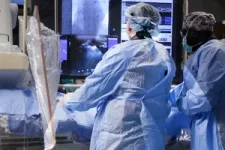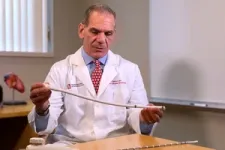New device gently moves esophagus, making heart ablations safer, study found
2023-05-21
(Press-News.org) A new device invented with the help of an electrophysiologist at The Ohio State University Wexner Medical Center makes a heart procedure safer for patients suffering from atrial fibrillation (AFib), a common irregular heart rhythm.
AFib affects millions of people worldwide and greatly increases their risk of stroke and heart failure. To treat AFib, doctors use cardiac ablation to help restore the heart’s rhythm. Heat or cold energy delivered through a catheter destroys the heart tissue causing rapid and irregular heartbeats. While the procedure is effective in treating AFib, the energy from the catheter tip is used only a few millimeters from the esophagus. There is a risk that the energy can cause a rare, but often fatal, hole between the esophagus and the heart called an atrioesophageal fistula.
To reduce the risk of damage to the esophagus, Emile Daoud, MD, section chief of the cardiac electrophysiology program and professor of internal medicine in the College of Medicine, helped develop the concept of physically moving the esophagus away from the catheter tip during an AFib ablation procedure. Using funds from an Accelerator Award from The Ohio State University’s Keenan Center for Entrepreneurship, Daoud helped design and test the device, called ESOlution. A clinical trial in the United States and Argentina showed that using the device significantly reduced injury to the esophagus without any adverse effects. Results of the trial were presented Saturday during the Heart Rhythm Society’s annual meeting.
“It has been frustrating to not have an effective method to protect the esophagus while delivering the ablation energy at the desired location. By using suction force, we’re able to pull in the esophagus and then move the entire segment to the side by only about an inch. This creates a safe pathway to deliver the treatment,” Daoud said.
The clinical trial of 120 heart ablation patients found that without the device, over a third had esophageal injuries, but when the device was used, less than 5% had any injury to the esophagus, Daoud said. If approved by the FDA for commercial use, the device would be the first specifically developed and tested therapy to prevent ablation-related esophageal injury. Ohio State owns a piece of the technology being developed by S4 Medical Corp. Daoud is co-founder of the medical company.
“How to safely protect the esophagus has been a well-recognized problem for at least 15 years. There are several techniques such as measuring the temperature inside the esophagus and using ultrasound or CT imaging to see where it’s located, but we still have esophageal injuries. This device is effective, inexpensive and connects to a vacuum suction, which is already in every electrophysiology laboratory” Daoud said.
Though this hasn’t been tested, Daoud believes moving the esophagus may also improve the effectiveness of the procedure. With the esophagus out of the way, doctors can safely deliver larger amounts of ablation energy when it’s needed.
Understanding where the esophagus was moved relative to the location of the ablation catheter tip may also help manage and assess patients who have concerning symptoms after ablation. Safe deviation of the esophagus means that an injury to the esophagus is unlikely the cause of a patient’s post procedure symptoms.
Amanda Mitchem, 59, of Mount Vernon, Ohio participated in the clinical trial at Ohio State and was randomly selected to have the device inserted during her ablation. She’d been suffering from AFib and simple daily tasks like doing laundry and dishes wore her out. When medication and mild electrical shocks to the heart didn’t work, she had the ablation.
“The following day was like night and day. I was breathing so much better, and I hadn’t felt that good in probably a year,” she said. “Before that, I could be just sitting and feel like I ran 10 miles.”
Now she’s back to traveling to West Virginia to play with her granddaughter and sharing her story with friends and family.
“Now I can breeze through going grocery shopping or to the flea market or yard sales. I can actually stand and have a conversation without having to gasp for breath,” she said.
###
END
ELSE PRESS RELEASES FROM THIS DATE:
2023-05-21
PHOENIX (May 20, 2023) – George D. Dangas, MD, PhD, MSCAI, Professor of Medicine (Cardiology and Surgery), and Director of Cardiovascular Innovation at the Zena and Michael A. Weiner Cardiovascular Institute at the Icahn School of Medicine of Mount Sinai in New York City, and Chief of Cardiology at Mount Sinai Queens assumed the office of president of the Society for Cardiovascular Angiography & Interventions (SCAI) today during the closing ceremonies at the SCAI 2023 Scientific Sessions in Phoenix, AZ.
Dr. Dangas is an authoritative voice in the performance of nonsurgical cardiovascular and valve interventions using both established ...
2023-05-21
PHOENIX (May 20, 2023) – Njambi Mathenge, MD, MPH, an interventional cardiology fellow at the Massachusetts General Hospital has been selected as the recipient of the SCAI-Women in Innovations (SCAI-WIN) CHIP Fellowship, the Society for Cardiovascular Angiography and Interventions announced today.
The $115,000 fellowship opportunity was made possible by support from Abiomed (founding supporter), Boston Scientific, Medtronic, and Shockwave Medical, Inc., and is offered to interventional cardiology (IC) fellows or practicing interventional cardiologists interested in ...
2023-05-21
PHOENIX (May 20, 2023) – Today during the SCAI 2023 Scientific Sessions, thirty early-career interventional cardiologists were the inaugural recipients of a newly created award highlighting excellence in interventional cardiology. 30 in Their 30’s is a new recognition program created by the Society for
Cardiovascular Angiography & Interventions (SCAI) for early-career members for their proven leadership and demonstration of SCAI’s core values.
30 in Their 30’s recognizes the best and brightest young professionals in interventional cardiology. This award ...
2023-05-21
PHOENIX (May 20, 2023) – Today, the Society for Cardiovascular Angiography & Interventions (SCAI) announced its 2023 Master Interventionalists of SCAI (MSCAI) designation recipients during the SCAI 2023 Scientific Sessions in Phoenix.
The MSCAI designation is awarded to individuals who have demonstrated excellence in invasive/interventional cardiology over the course of their career and for their commitment to the highest levels of clinical care, innovation, publication, and teaching.
This year’s MSCAI designations were awarded to the following group of outstanding interventionalists:
David ...
2023-05-20
New Orleans, May 20, 2023 – Today, the Heart Rhythm Society (HRS), Asia Pacific Heart Rhythm Society (APHRS), and Latin American Heart Rhythm Society (LAHRS) released a new clinical practice guideline on cardiac physiologic pacing (CPP) strategies to restore ventricular synchrony and improve cardiac performance. The 2023 HRS/APHRS/LAHRS Guideline on Cardiac Physiologic Pacing for the Avoidance and Mitigation of Heart Failure is intended to provide guidance to clinical cardiac electrophysiologists, cardiologists, and other clinicians on the use of CPP, which includes cardiac resynchronization therapy and conduction system pacing, in patients ...
2023-05-20
Tokyo Institute of Technology (Tokyo Tech) Global Scientific Information and Computing Center (GSIC) and Hewlett Packard Enterprise (NYSE: HPE) announced to build its next-generation supercomputer, TSUBAME4.0, to accelerate AI-driven scientific discovery in medicine, materials science, climate research, and turbulence in urban environments.
Tokyo Tech is one of the world's leading universities in science and technology. With the TSUBAME4.0 supercomputer, users will have the ability to train ...
2023-05-20
Prague, Czechia – 20 May 2023: People with strong legs are less likely to develop heart failure after a heart attack, according to research presented today at Heart Failure 2023, a scientific congress of the European Society of Cardiology (ESC).1
Myocardial infarction is the most common cause of heart failure,2 with around 6–9% of heart attack patients going on to develop the condition.3,4 Previous research has shown that having strong quadriceps is associated with a lower risk of death in patients with coronary artery disease.5
This study tested ...
2023-05-20
Prague, Czechia – 20 May 2023: The first investigator-initiated study of remote pulmonary artery pressure monitoring has found that it improves quality of life and reduces heart failure hospitalisations in patients with chronic heart failure. The findings are presented today in a late breaking science session at Heart Failure 2023, a scientific congress of the European Society of Cardiology (ESC),1 and published in The Lancet.
Principal investigator Dr. Jasper Brugts of Erasmus University Medical Centre, ...
2023-05-20
Transthyretin-related cardiac amyloidosis is a progressive disease characterized by the deposition of amyloid protein fibrils in the heart. Amyloid fibril deposition thickens and stiffens the heart walls, and the disease is also known as stiff-heart syndrome. The accumulation of amyloid fibrils causes heart failure, and patients suffer from fluid retention, fatigue, and arrhythmias. The disease can be caused by genetic mutations or related to aging. Prognosis is poor, and untreated patients survive for an average of just 3 years.
Now, the ...
2023-05-20
The Society for Cardiovascular Angiography & Interventions (SCAI) has named George Dangas, MD, PhD, Professor of Medicine (Cardiology), and Surgery, at the Icahn School of Medicine at Mount Sinai as its new President. He was appointed on Saturday, May 20, during the closing ceremonies at the SCAI 2023 Scientific Sessions in Phoenix. He is the first Mount Sinai cardiologist to hold this position and will serve as the 46th President of SCAI.
Dr. Dangas, also the Director of Cardiovascular Innovation at the Zena and Michael A. Wiener Cardiovascular Institute at Icahn Mount Sinai and Chief of Cardiology ...
LAST 30 PRESS RELEASES:
[Press-News.org] New device gently moves esophagus, making heart ablations safer, study found





